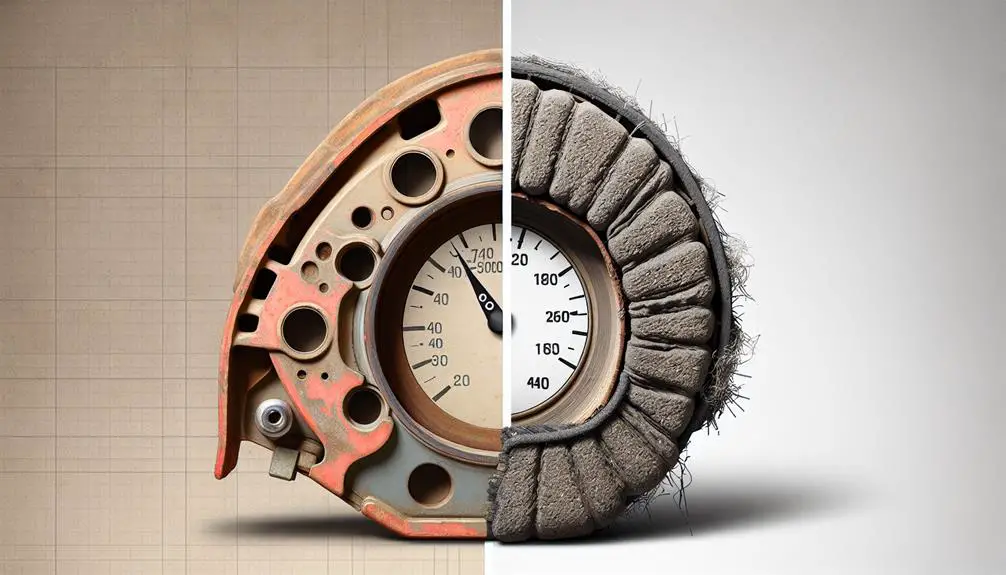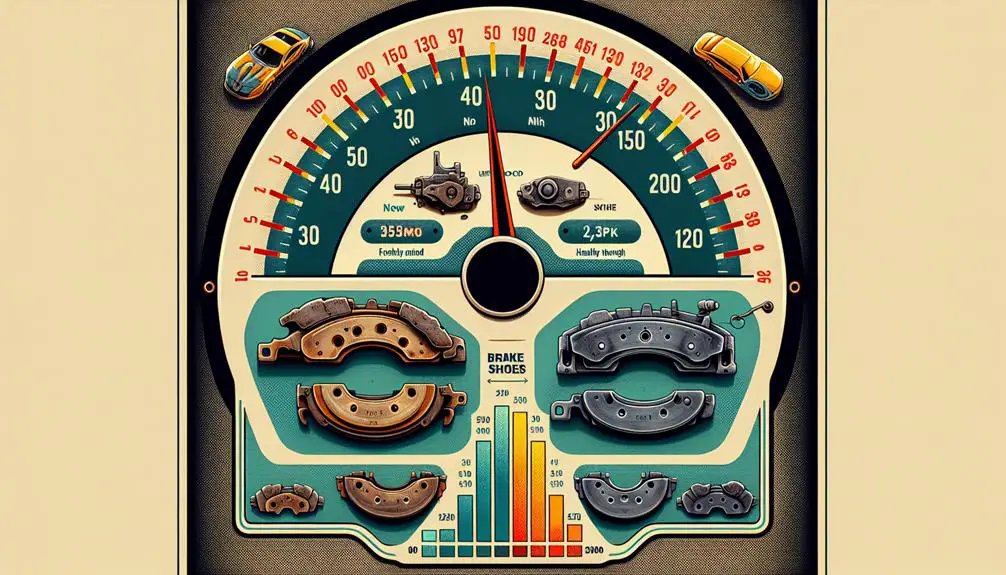Brake shoes typically last between 20,000 to 40,000 miles, but their lifespan varies widely due to factors such as driving habits, environment, and vehicle type.
Understanding these influences is key to optimizing the life of your brake shoes and ensuring your vehicle maintains its safety and responsiveness on the road.
Understanding Brake Shoe Lifespan

To fully grasp how long brake shoes last, it's crucial to understand that their lifespan depends largely on your driving habits and conditions. Generally, brake shoes can last anywhere from 20,000 to 40,000 miles. However, this range isn't set in stone. You've got to take into account the composition of the brake shoe material itself. There are different types of materials used in manufacturing brake shoes, including organic, metallic, and ceramic, each offering varying degrees of durability and performance.
You might be wondering why there's such a broad range in lifespan. It's due to not all driving being created equal. If you're frequently moving through city traffic, with its stop-and-go nature, you're going to be using your brakes a lot more than someone who's mostly cruising on highways. This constant braking wears down the brake shoes faster.
It's also worth noting that while you're focusing on the mileage, the age of the brake shoes can be just as crucial. Over time, even without heavy use, the material can deteriorate. This means that even though you haven't reached the high end of the mileage range, you might still need to check on them.
Factors Affecting Durability
Several factors can greatly influence the durability of your brake shoes, ranging from driving habits to the environment you drive in.
To begin with, your driving style plays a critical role. If you're someone who frequently brakes hard or rides the brakes, you're putting extra wear on your brake shoes. This aggressive braking generates more heat and friction, wearing down the brake material faster than someone who brakes gently and gradually.
Then there's the environment. Driving in a city with frequent stops and starts wears out brake shoes quicker than cruising on highways. Equally, if you live in a hilly or mountainous area, the constant need to brake on descents can accelerate wear.
The type of vehicle you drive also matters. Heavier vehicles exert more pressure on brake shoes than lighter ones, leading to quicker wear. Furthermore, if your car is often loaded with heavy cargo or tows trailers, this added weight increases the stress on your brakes.
Average Mileage Expectancy

Knowing your brake shoes' average mileage expectancy can help you anticipate maintenance needs and avoid unexpected failures. Generally, brake shoes last between 20,000 to 40,000 miles. However, this range isn't set in stone. Your driving habits play a vital role in their longevity. If you're often in stop-and-go traffic or you tend to brake hard, you'll find yourself replacing them more frequently than someone who drives mostly on highways with smooth, consistent speeds.
Different vehicles have varying demands on brake shoes. Heavy-duty vehicles or those frequently used for towing will have a shorter brake shoe lifespan crucial to the increased strain. Conversely, lighter vehicles or those primarily used for leisurely drives may see their brake shoes lasting towards the upper end of the average range.
Signs of Wear and Tear
Recognizing the signs of wear and tear on your brake shoes is crucial for maintaining your vehicle's safety and performance. As brake shoes wear down, their ability to stop your car effectively diminishes, which can lead to increased stopping distances and, in worst-case scenarios, accidents. To make sure you're not caught off guard, here are several indicators that your brake shoes need attention:
- Unusual noises: If you hear squealing, grinding, or clicking noises when you apply the brakes, it's a clear sign that your brake shoes are wearing down.
- Decreased brake responsiveness: When your brake shoes are worn out, you may notice that your vehicle takes longer to stop than usual or that the brake pedal feels 'spongy.'
- Vibration when braking: A pulsating or vibrating sensation through the brake pedal or steering wheel during braking is often a symptom of uneven wear on the brake shoes.
- Visual wear: Lastly, physically inspecting your brake shoes for signs of wear, such as thinning or uneven wear patterns, can provide a direct indication that it's time for a replacement.
Being aware of these signs and acting promptly can help guarantee your safety on the road.
Extending Brake Shoe Life

To extend the life of your brake shoes, it's important to adopt certain maintenance practices and driving habits. Regular maintenance checks and adjustments can greatly improve the longevity of your brake shoes, as can adopting a smoother driving style. Here's how you can make those brake shoes last longer:
| Maintenance Practices | Driving Habits |
|---|---|
| Regular brake inspections | Avoid heavy braking |
| Cleaning and adjusting | Coasting to slow down |
| Replacing brake fluid | Avoiding high speeds |
| Ensuring proper alignment | Using engine braking |
Getting your brakes inspected regularly lets you catch any issues early, preventing further damage. Cleaning and adjusting your brake system helps maintain its efficiency, which means less strain on your brake shoes. Replacing the brake fluid is also key, as old or contaminated fluid can affect braking performance. Ensuring your vehicle's wheels are properly aligned reduces uneven wear on the brake shoes.
When it comes to driving habits, try to avoid heavy braking and high speeds, both of which can lead to faster wear. Instead, coast to a slower speed before applying the brakes gently. Using engine braking by shifting down gears can also help in reducing reliance on your brake shoes, extending their life even further.
Conclusion
So, you've got the lowdown on brake shoe lifespan. Remember, several factors can alter their durability, but on average, they're good for about 20,000 to 40,000 miles.
Keep an eye out for signs of wear and tear like strange noises or a decrease in braking power.
Want to make them last longer? Regular maintenance is key. By staying on top of their condition, you can guarantee your brake shoes carry you safely for many miles to come.